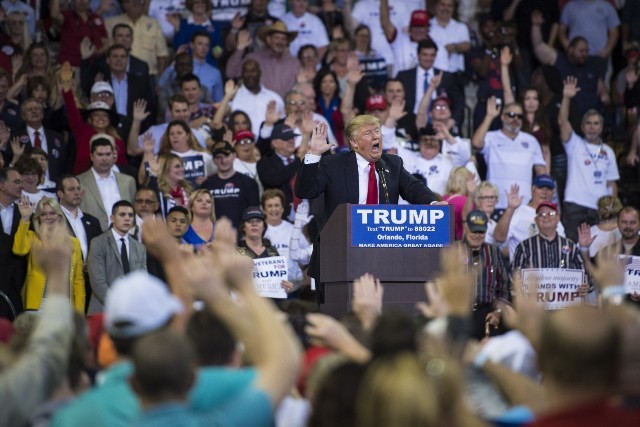The “Trump Effect”: How Our President Affects Modern Youth
As our President, Trump’s influence plays a key role in societal change over the next few years. Younger generations have many decisions ahead as to what to make of his conservative policy and abrasive attitude. (Photo credit to Jabin Botsford, The Washington Post)
March 15, 2017
With all the rallies and protests clogging the drains of the anti-Trump culture, a cry for help for future generations has been shoved to the media’s back corner. In a Washington Post article, columnist Petula Dvorak begs that we ask ourselves not only what changes will come within the next four years but also acknowledge the threat it will impose upon today’s youth in the sense of morality and political views. Dvorak expresses her fear that the common view on Trump as being an enabler of racism and inequality will inspire the idea that this behavior is acceptable among impressionable generations, and the effects have already begun to show.
“’Build the wall!’ That was the chant at a high school basketball game in Indiana last week, directed by white kids from a majority-white school who held up Trump signs and yelled at the opposing players and fans, who were from a predominantly Latino school.” Dvorak exemplifies the rippling effect the presidential campaign has had on many controversial topics, supporting her idea that things are not as they used to be.
So what entirely will a Trump presidency mean for the future generations of America? With such a huge switch in party control, there will be change among those so heavily exposed to societal reconstruction. People are now more than ever surrounded by political choices and views, and Trump’s actions in the office will change the rest of America’s future. Unfortunately, the Trump campaign has always carried a negative connotation. His general abrasiveness has not won many admirations, and his displeasing comments are often interpreted as borderline-racist, misogynistic, and hateful altogether. Parents are justifiably worried that the environment created by the misconception of Trump’s views will be detrimental to their children.
However, Trumps ideology is not everything it is cut out to be: when taken out of context, what he believes to be best for our country is not always what is best in a more personal setting. Heightened immigration regulations do not equate placing “Trump signs” in students’ hands and encouraging racially hateful comments. It is not Trump’s opinions but rather the perception of them that is so dangerous, as many who dislike him personally are quick to interpret his views in a false negativity. And while his voice may have influence over the nation, it is easy to forget that it is not President Trump’s responsibility to raise our children. Today’s teenagers and young adults will face different trials than their parents and grandparents, but will ultimately have to decide for themselves their own political views on Trump’s actions and whether or not they want to deduce negativity from his media appearance.
Of course, it is true that societal change will affect the overall nature of the future: people’s political stance will alter as new leadership takes place and introduces new ideas. However, the president is not responsible for the outcome of modern youth. Everyone will be affected by new leadership, but that has been the case with every presidency; rather than condemning Trump’s public image as mental poison, allow the children of concern to mature and develop their own opinions. And if parents disapprove of any habits their children may have picked up from political news, then it is in their court to correct it.
Links:
https://www.washingtonpost.com/local/the-trump-effect-is-contaminating-our-kids–and-could-resonate-for-years-to-come/2016/03/07/594a7f46-e47a-11e5-a6f3-21ccdbc5f74e_story.html?utm_term=.cda4d1f273d0




